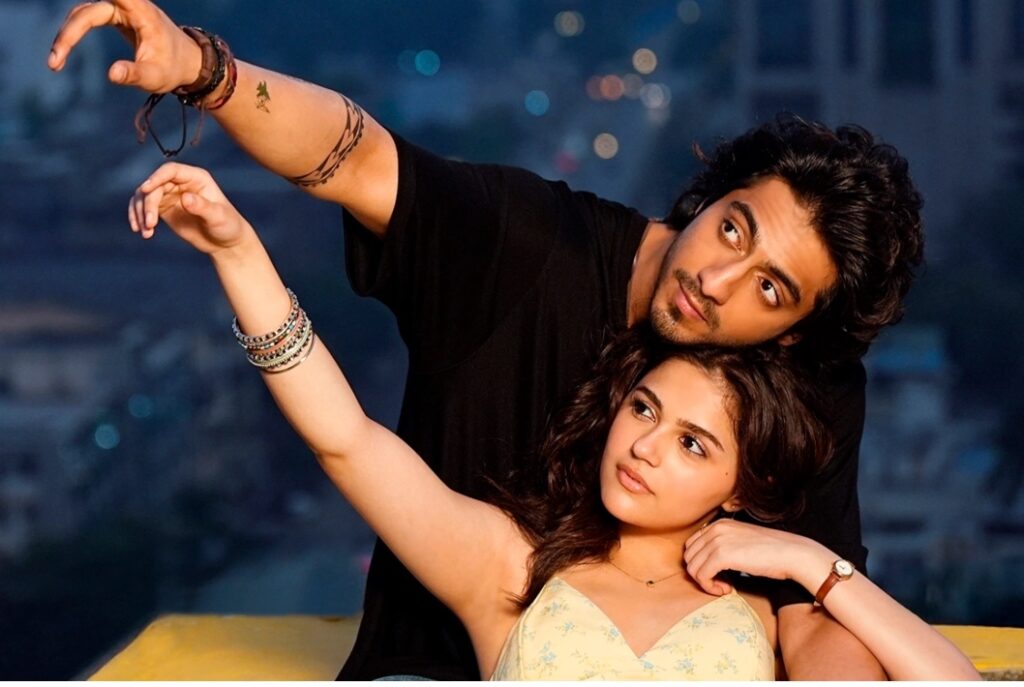Mohit Suri’s Saiyaara may, at first glance, appear to follow a familiar arc wherein opposites attract, love blossoms, conflict arises, and reconciliation follows. But in this case, familiarity isn’t a cliché. It reminds us that even overused tropes, when pursued with depth and grace, can still resonate deeply.
After a painful heartbreak, Vaani Batra (Aneet Padda) tries to move on with her life. She joins a digital news agency as a celebrity reporter. During one of her assignments, she meets Krish Kapoor (Ahaan Panday), a struggling singer who’s looking for a lyricist for his next collaboration with a fading pop star. Vaani agrees to help on the condition that Krish gives her exclusive content for her platform, including interviews and live sessions. As they begin working together, a professional arrangement slowly turns into something more. Just when it seems like love might be around the corner, Vaani uncovers a bitter truth that will turn her world upside down…
Saiyaara feels like Mohit Suri’s most restrained and mature work in a filmography that spans two decades. While traces of his earlier films, particularly Aashiqui 2 (2013), may linger in the background, here, there’s a quiet confidence in the way he lets the story unfold. Suri seems less interested in overt melodrama this time and more drawn to the quiet negotiations that shape intimacy. The emotional arcs unfold not through grand gestures but through glances, silences, and the pauses between words. He reveals an understanding that a love story, at its most affecting, doesn’t always rely on subverting expectations, but on emotional precision.
The screenplay by Sankalp Sadanah, with dialogues by Rohan Shankar, stays close to the emotional rhythms of its two protagonists, tracing the quiet shifts in their relationship with a sense of familiarity. The writing doesn’t push us forward. It invites us in, allowing us to walk alongside these characters as they navigate the fragile terrain of connection and compromise. What elevates this tale of mismatched lovers is the tender, almost melancholic texture with which it unfolds. Both Krish and Vaani carry the weight of past wounds. An ex-boyfriend has betrayed her, while he grew up under the shadow of an alcoholic father. Each bears a different kind of emotional scar. So, when they gradually become companions in each other’s lives, the film doesn’t ask what love can repair. But whether two people can still find wholeness in what remains. In doing so, it creates a world where love rarely arrives with easy solutions. Instead, it brings fresh complexities, and the conflict of how to live with them.
The presence of parents in both Krish and Vaani’s lives is treated with an affecting touch, showing how, at different moments, they offer support and grounding. Yet their appearances feel somewhat unanchored within the broader narrative, surfacing more as gentle echoes rather than fully integrated threads. Similarly, the return of Vaani’s ex-lover remains underexplored, used more to create some narrative tension and little else. The film also takes a subtle dig at the way nepotism is favoured by the paparazzi and how popular songs tend to have increasingly shorter shelf lives. While the intention is clear, these moments could have been handled with a little more sharpness. Moreover, the clinical condition affecting one of the characters is also treated with a degree of creative liberty, more in service of emotional stakes.
In his debut, Ahaan Panday brings a surprising degree of maturity to the role of Krish. As a gifted singer navigating a world that has not always been kind to him, he anchors the character’s anger and charm with skill, steering clear of the over-familiar, lover-boy mould that often defines male leads in Hindi cinema. Aneet Padda, as Vaani, embodies a woman trying to mend her emotional fractures with her inner strength. There’s a gentleness to her presence, coupled with a sharpness of mind and a refusal to be silenced. Yet over time, her range of expression begins to plateau and become slightly static. Geeta Aggarwal, as Vaani’s mother, brings both sternness and warmth to her role. She is a portrait of protective maternal care rendered with understated conviction. Rajesh Kumar and Varun Badola, as father figures, leave brief but memorable impressions.
Vikas Sivaraman’s fluid cinematography mirrors the youthful energy of the film. His visual style never draws attention to itself, allowing the framing and movement to follow the emotional rhythm of the film. The editing, by Rohit Makwana and Devendra Murdeshwar, maintains a steady pace that keeps us engaged without ever feeling rushed or overly composed. The production design by Laxmi Keluskar and the late Rajat Poddar is sleek and contemporary, while John Stewart Eduri’s background score adds texture and amplifies the film’s most vulnerable moments. The soundtrack, crafted by a team of composers including Mithoon, Sachet-Parampara, Tanishk Bagchi, Rishabh Kant, Vishal Mishra, Faheem Abdullah, and Arslan Nisami, is not only memorable as a standalone album but also impressively woven into the narrative. Saiyaara reaffirms that when used thoughtfully, music in mainstream Hindi cinema can still serve a purpose rather than mere ornamentation.
Saiyaara may not aspire to greatness in the traditional sense, but it rekindles our belief in the emotional power of love stories through moments of measured tenderness. In a cinematic landscape crowded with high-concept spectacle and middling-to-high levels of mediocrity, it arrives like a gentle breeze. Modest in scale, yet simple, soothing, and rich in feeling.
Hindi, Romance, Drama, Color


